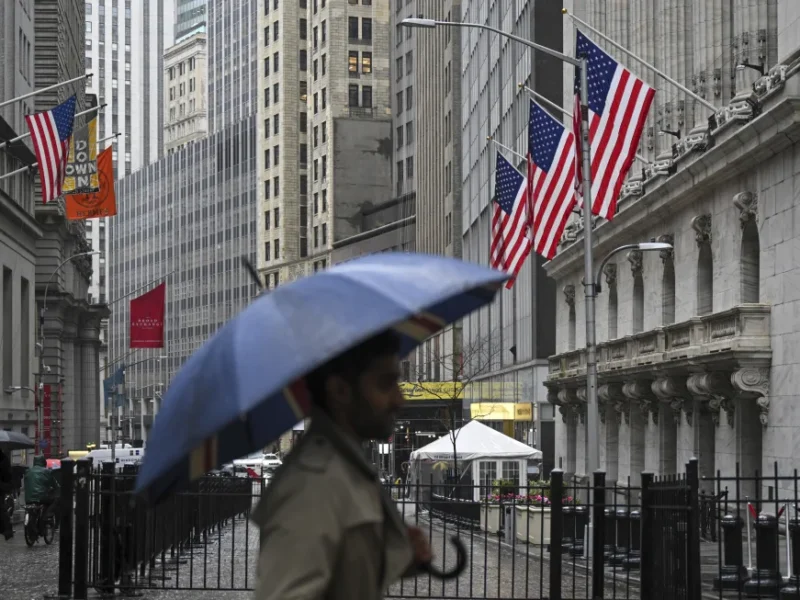The robust stock market rally of 2024 has abruptly come to a halt. In April, the S&P 500 index has declined by 4.6%, marking the first negative month for all three major US indexes since last October. The Dow Jones Industrial Average is on the verge of erasing its gains since the beginning of the year, with only a 0.2% increase, while the S&P 500 has risen by 5.1% and the Nasdaq Composite by 3.9%. CNN’s Fear & Greed Index, which gauges market sentiment, has shifted to a “fear” reading from “greed” a month ago.
Several factors contribute to this turmoil. Strong economic indicators and persistent inflation have caused Wall Street to postpone its expectations for the Federal Reserve’s interest rate cuts. Additionally, escalating tensions in the Middle East have led to an increase in oil prices. Recent data has shown inflation remaining above the Fed’s 2% target, with employers adding a remarkable 303,000 jobs in March. Consumer spending in US retailers has also increased for the second consecutive month, indicating resilience despite high interest rates.
Fed Chair Jerome Powell’s recent statement suggests that rate cuts may occur later than anticipated, requiring more signs of moderating inflation before the central bank shifts its stance. Traders now anticipate rate easing by July or September, contrary to earlier projections of up to six rate cuts starting in March.
The International Monetary Fund (IMF) has upgraded its forecast for US economic growth but warns of challenges in curbing inflation. The IMF suggests a cautious approach to monetary easing by the Federal Reserve due to the US economy being “overheated.”
Bond yields have surged as investors anticipate prolonged elevated rates. The 10-year US Treasury yield reached 4.65% on Thursday.
Despite hopes that corporate earnings would revive the market, only a modest 0.9% growth in blended first-quarter earnings has been reported so far. Investors are also concerned about escalating tensions in the Middle East, following airstrikes between Iran and Israel.
Oil prices initially rose on reports of the attacks but later reversed gains as the extent of the action became clear. Gold futures have seen an increase as investors seek refuge from geopolitical uncertainty and persistent inflation.
Mortgage rates in the US have surged beyond 7%, hitting their highest level since November.
This week saw a significant surge in mortgage rates, surpassing the crucial 7% mark and exacerbating America’s housing affordability crisis, as reported by my colleague Bryan Mena.
According to data released by Freddie Mac on Thursday, the average rate for a 30-year fixed-rate mortgage stood at 7.10% for the week ending April 18, up from 6.88% the previous week. A year ago, the average rate was 6.39%.
The breach of the 7% mark is a notable psychological threshold that hadn’t been crossed so far this year.
The upward trend in mortgage rates is driven by expectations that the Federal Reserve will not be cutting interest rates in the near future. While the Fed doesn’t directly control mortgage rates, its policy decisions influence them, and the ongoing high inflation figures are keeping the Fed from making any rate cuts.
Freddie Mac’s chief economist, Sam Khater, highlighted the dilemma faced by potential homebuyers: whether to purchase now before rates climb further or to wait in anticipation of potential decreases later in the year.
If inflation persists or worsens, there is a possibility that mortgage rates could continue to rise throughout the year.
Apple intends to increase its investment in Vietnam as it diversifies its manufacturing beyond China.
Apple is set to increase its procurement of components from Vietnam, reflecting a broader trend among global tech companies to diversify their supply chains beyond China. This move aims to reduce costs, secure supply chains, and tap into new markets, as reported by my colleague Anna Cooban.
CEO Tim Cook announced this plan during a meeting with Vietnamese Prime Minister Pham Minh Chinh in Hanoi on Tuesday, according to a statement from Vietnam’s government.
Since 2019, Apple has already invested nearly $16 billion in its supply chain in Vietnam, creating over 200,000 jobs in the country, as per the government’s statement.
During the meeting, Cook expressed Apple’s readiness to strengthen cooperation and investment in Vietnam, highlighting the country’s significance for global companies seeking alternatives to China amid escalating trade tensions between Beijing and the West.
Cook’s visit underscores Vietnam’s increasing importance as a destination for companies seeking to diversify their manufacturing bases away from China.











